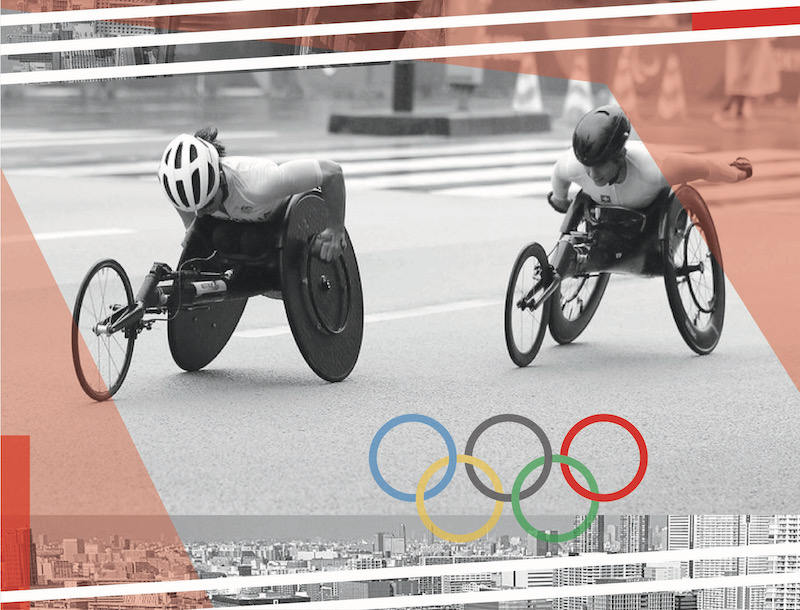
Dr Adam Rugg
Associate Professor in Communication and Co-Director of the Sports Media Program at Fairfield University. His research focuses on the intersection of sport, media, and social issues, with an emphasis on critically examining the ways in which league and team marketing and advertising media negotiate issues of gender, race, and nationalism
Twitter: @Adam_Rugg

Section 5: Politics of Sport
- Twitter conversations on Indian female athletes in Tokyo
- ”Unity in Diversity” – The varying media representations of female Olympic athletes
- The Olympic Channel: insights on its distinctive role in Tokyo 2020
- How do we truly interpret the Tokyo Olympic ratings?
- Between sexualization and de-sexualization: the representation of female athletes in Tokyo 2020
- Reshaping the Olympics media coverage through innovation
- An Olympic utopia: separating politics and sport. Primary notes after analyzing the opening ceremony media coverage of mainstream Spanish sport newspapers
- What place is this? Tokyo’s made-for-television Olympics
- The paradox of the parade of nations: A South Korean network’s coverage of the opening ceremony at the 2020 Tokyo Olympics
- Tokyo 2021: the TV Olympics
- Why we need to see the “ugly” in women’s sports
- “The gender-equal games” vs “The IOC is failing black women”: narratives of progress and failure of the 2020 Tokyo Olympics
- Ghana: Poor local organizing, and absence of football team dampens interest
- Megan Rapinoe: The scary Bear for many Americans?
- ‘A Games like no other’: The demise of FTA live Olympic sport?
- Temporality of emotionalizing athletes
- Fandom and digital media during the Tokyo 2020 Olympic Games: A Brazilian perspective using @TimeBrasil Twitter data
- Media wins medal for coverage of athletes as people, instead of entertainers
- Reporting at a distance. Stricter working conditions and demands on sports journalists during the Olympics
- New Olympic sports: the mediatization of action sports through the Olympic Games 2020 Tokyo
- Simone Biles, journalistic authority, and the ideology of sports news
- Representations of gender in the live broadcast of the Tokyo Olympics
- Americans on ideological left more engaged in Summer Olympics
- Nigeria: Olympic Games a mystery for rural dwellers in Lagos
- National hierarchy in Israeli Olympic discourses
- Equestrian sports in media through hundred Olympic years. A roundtrip from focus to shade and back again?
- Reshaping the superhuman to the super ordinary: The Tokyo Paralympics in Australian broadcasting media
- Is the Paralympic Games a second-class event?
- The fleeting nature of an Olympic meme: Virality and IOC TV rights
- Tokyo 2020: A look through the screen of Brazilian television
- Is the Paralympic Games a second-class event?
- How digital content creators are shaping meanings about world class para-athletes
- How digital content creators are shaping meanings about world class para-athletes
- The male and female sports journalists divide on the Twittersphere during Tokyo 2020
- Super heroes among us: A brief discussion of using the superhero genre to promote Paralympic Games and athletes
- “Everything seemed very complicated”: Journalist experiences of covering the Tokyo 2020 Paralympic Games
- Representing high performance: Brazilian sports journalists and mass communication professionals discuss their philosophies on producing progressive Paralympic coverage
- Representations of gender in media coverage of the Tokyo 2020 Paralympic Games
US gymnast Simone Biles’ decision to withdrawal from the Women’s team final, citing her inability to safely perform her routines stemming from mental stress, ignited an intense period of coverage and debate across media platforms and social media. Initially at the center of these debates were a bevy of larger, intersecting cultural and political issues within sport (and beyond) centered on the prioritizing of mental health and self-care, the demands of sport, and duty to one’s team and country. At once Biles was wrapped up in these debates which positioned her along a continuum from an activist taking a heroic stand against the dehumanizing structures of sport to a selfish complainer who failed her teammates and her country. As the Columbia Journalism Review noted, however, mainstream media coverage was generally supportive of Biles, with NBC Olympics host Mike Tirico concluding the broadcast of the event by saying, “whether or not we see the great Simone Biles compete again, hopefully the next stop on her journey is joy.”
Over the course of the Olympics Biles’ withdrawal became intertwined with other moments, such as Irish Boxer Kellie Harrington’s imploring of the other medalists to come share her gold medal podium and high jumpers’ Mutaz Essa Barshim and Gianmarco Tamberi’s celebratory realization that they could forego a winner-takes-all jump off and instead share the gold medal. A broader narrative then emerged within mainstream media about the lessons and impact of these Olympics. In articles across ESPN, Sports Illustrated, the New Yorker, the New York Times, the Baltimore Sun, the Minnesota Star-Tribune, and others, frequent mention was made of how these events reminded us of the humanity of these athletes and their support for each other, standing in opposition to the conventional demands of sport put forth by sports media outlets, sporting organizations, and fan cultures. In the words of NBC Sports’ Tim Layden, an “evolution” was taking place at the Olympics.
As sports scholars have long detailed, sport has historically been a site where athletes are mythologized within heroic narratives that reinforce the power of the athlete to overcome any amount of pain, injury, stress, or other difficulties through sheer force of will and determination. These myths also celebrate the ultra-competitive, sacrificial expectations of sport that calls for beating down the opponent and the self in single-minded pursuit of victory. Research has further shown the physical and mental harm that can come to athletes as they sacrifice their bodies and minds in the pursuit of adhering to these unsustainable (and often unattainable) physical and mental expectations.
However, despite the laudatory profiles of these moments that celebrate their defiance against sporting norms, much of the framework of these stories produced familiar narratives about athletes that themselves stayed embedded within the conventional storytelling narratives of sport. Particularly with Biles, the most enthusiastic coverage was filled with riveting, dramatic prose that centered on her ‘victory,’ with pieces proclaiming her a champion, declaring her withdrawal a greater achievement than a gold medal, comparing it to the historic Men’s 400 meter hurdles race, and labeling it as a “haymaker to the chin” of contemporary sporting structures. Her act of resistance, it would seem, fit neatly into the pre-existing scripts of undeniable heroism and singular achievement that her act rejected in the first place.
The acts of Biles, Harrington, Barshim, Tamberi, and others are indeed notable and worthy of applause. However, if these moments are truly actions that stand against the lofty expectations and hyper-competitive pressures of modern sport then they are at least in part a stand against the frames of heroic spectacle and triumphant, dramatic narrative that proliferate across media coverage of sport and reinforce those expectations and pressures. So far, however mainstream media coverage has seen fit to celebrate, or at least legitimize, these moments with limited introspection (as noted by Slate). For the future it is worth paying attention to whether mainstream media coverage of sport will also ‘evolve’ to reflect the lessons imparted by these athletes or whether their moments of humanity were just another part of the mythmaking.

